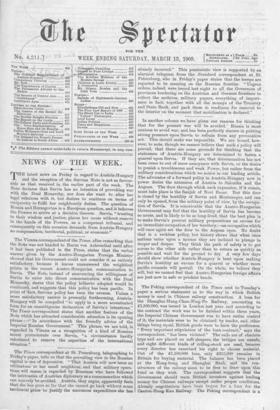In another column we have given our reasons for thinking
that for the present war will be avoided." Russia is most anxious to avoid war, and has been perfectly sincere in putting strong pressure upon Servia to refrain from any provocative act. This should make war impossible. We are bound, how- ever, to note, though we cannot believe that such a policy will prevail, that there are some grounds for thinking that the statesmen of Austria-Hungary are determined to fasten a quarrel upon Servia. If they are, that determination has not been come to out of mere annoyance with Servia, or the desire to punish a troublesome and weak Power, but rather from the military considerations which we notice in our leading article. The advocates of a forward policy in Austria-Hungary now in power desire the extension of Austria to Salonika and the Aegean. The door through which such expansion, if it comes, must take place is the Sanjak of Novi Bazar. But this door is closed by the hostility of Servia, and Montenegro, and can only be opened, from the military point of view, by the occupa,- tion of Berrie,. It is conceivable that the Austro-Hungarian Government may feel that the hostility of Servia has become so acute, and is likely to be so long-lived, that the best plan' is to make Servia's present military preparations an excuse for an immediate occupation of her territory,—an occupation which will once again set the door to the Aegean open. No doubt that is a reckless policy, but history shows that 'when 'once nations enter upon a morass they are inclined to plunge in deeper and deeper. They think the path of safety is to get across to the other side rather than to return as quickly as possible and wait for the ground to dry. A very few days ' should show whether Austria-Hungary is bent upon making Servia's hostility an excuse for a quarrel or whether more Pacific counsels will prevail. On the whole, we believe they will, but we cannot feel that Austro-Hungaxian foreign affairs are just now in safe or prudent hands.






































